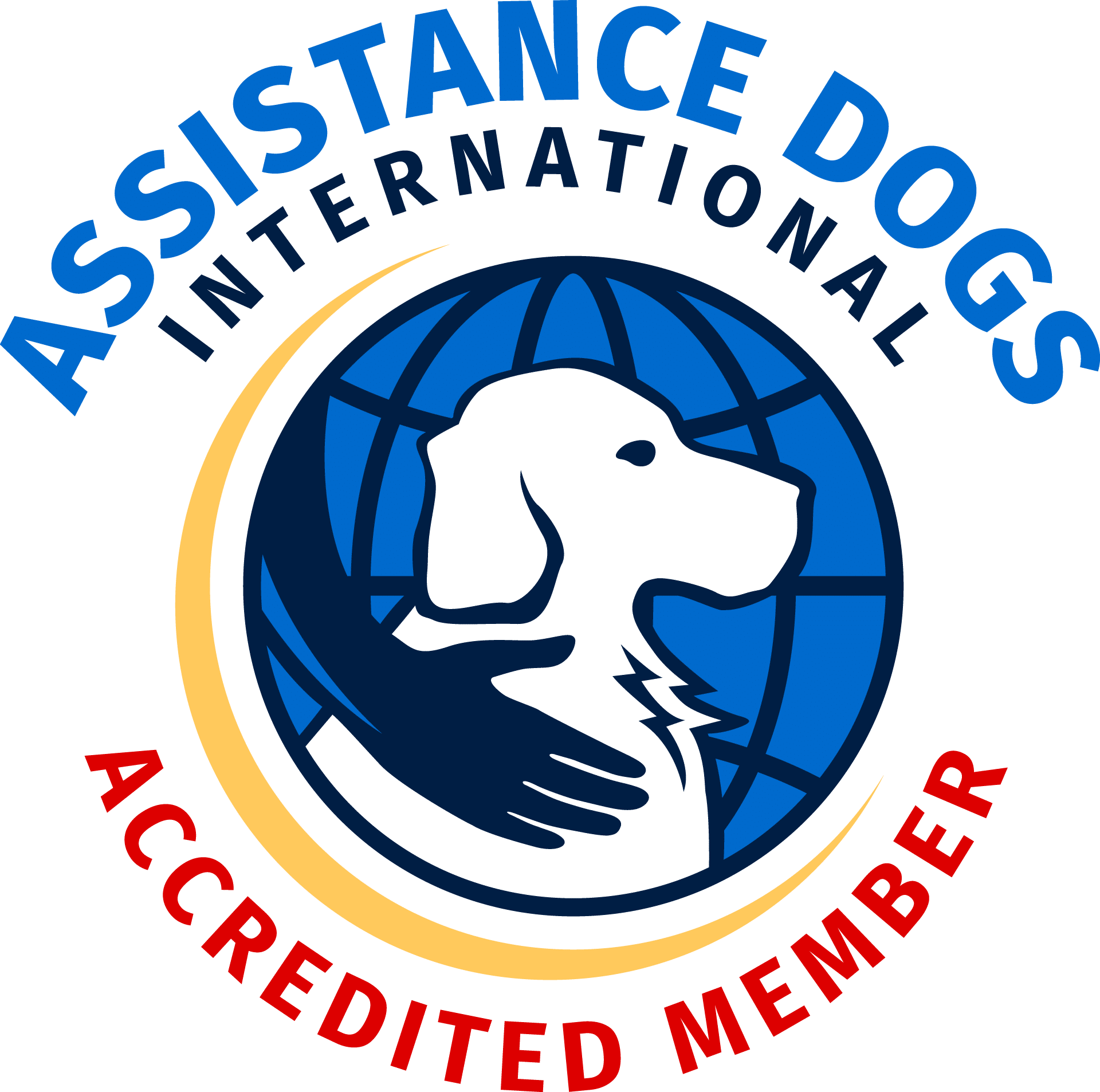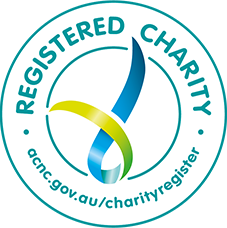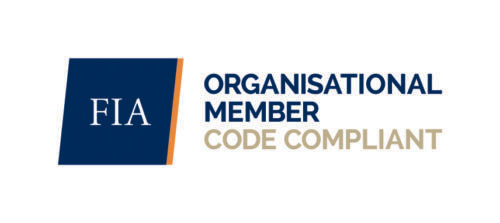FAQs
Disclaimer: The links to sites other than assistancedogs.org.au are provided as a convenience and for informational purposes only. They do not constitute an endorsement or an approval by Assistance Dogs Australia (ADA) of any of the products, services or opinions of the business, organization or individual. Assistance Dogs Australia bears no responsibility for the accuracy, legality or content of the external site or for that of subsequent links. Please contact the external site for answers to questions regarding its content.
Assistance Dogs Australia is:
a not for profit organisation accredited with Assistance Dogs International (ADI) and Guide, Hearing and Assistance Dogs (GHAD).
Assistance Dogs Australia currently provide accredited assistance dogs for persons living with:
- Post-traumatic stress disorder PTSD Assistance Dogs (Police, Military and Fire Fighters only, at this time)
- Physical disability Mobility Assistance Dogs
- Autism Autism Assistance Dogs
- Educational Support Educational Support Dogs
What programs are NOT provided by Assistance dogs Australia at this time?
- Medical Alert dogs for people living with diabetes or epilepsy
- Dogs specific to Anxiety and/or depression
- Guide/Hearing dogs
What is an Assistance Dog?
Assistance Dog is a generic term for a guide, hearing, or service dog specifically trained to perform identifiable physical tasks and behaviours to assist a person with a disability in order to aid in quality of life and/or independence. Assistance dogs are covered under many legislative access laws for public access rights when working with their handler who lives with a disability.
Assistance dogs are not to be confused with a therapy, emotional support or companion dog which are not required to undertake a Public Access Test (PAT)
All dogs can intrinsically provide emotional support to a human being. Assistance dogs are different from emotional support dogs in that they are specifically trained to perform identifiable tasks to increase independence and/or quality of life.
What does an Assistance Dog do?
- Open and close doors, drawers, cupboards and fridge
- Retrieved dropped items
- Press the button at the traffic lights
- Take the washing out of the machine
- Remove items of clothing
- Pay the cashier at the shops
- Alert bark if their owner is in danger
Apart from the tangible day-to-day tasks an Assistance Dog can:
- Assist with the development and improvement of motor skills
- Provide greater freedom and independence
- Reduce the need for a carer
- Improve self-esteem and confidence
- Give love and companionship
Assistance Dogs Australia provides Assistance Dogs and their recipients with public access rights in accordance to the rules and regulations of Assistance Dogs International.
Why are your applications closed and when will they reopen?
Due to the success of our program, we have closed applications until we reduce our waiting list times. If applications had remained open, at this time, this would have resulted in unreasonably long wait times to receive an Assistance Dog. Please continue to check our website for announcements on the reopening of applications. We do not take names to advise when our services are open again.
Who is eligible to apply for one of your dogs?
Any person who meets the criteria for the services we offer.
How long will it take to receive a dog if I am accepted onto your waiting list?
As there are many variables that need to be considered during our matching process, we are not able to accurately advise on wait times
Can Assistance Dogs Australia help train/accredit/register my own dog or puppy?
- Assistance Dogs Australia do not train/accredit/register dogs or puppies that are not part of our program.
- As an accredited organisation Assistance Dogs Australia only provide assistance dogs to people who have completed our application process in the services we offer.
For more information on programs not provided by Assistance Dogs Australia please see GHAD approved trainers and training institutions throughout Australia or Assistance Dogs International (ADI).
Assistance Dogs Australia’s accredited dog and handler teams will have:
– Completed a Public Access Test (PAT) to receive accreditation – this is an annual test.
– A navy blue jacket that is clearly marked to include:
– Assistance Dogs International logo
– Assistance Dogs Australia logo
– A handler’s licence including photo identification
– ID tag on their collar
Examples:
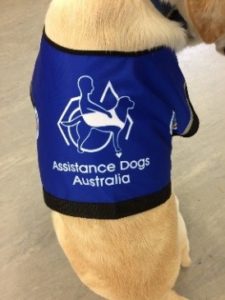
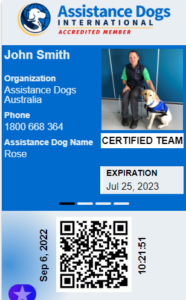
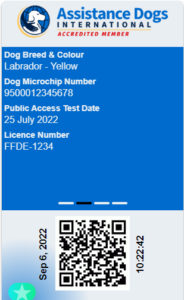
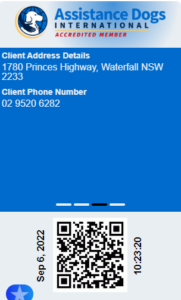
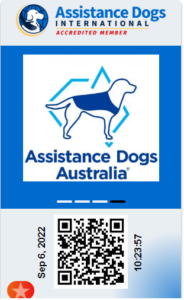

Can Assistance dogs Australia accredit/register my dog as an Emotional Support Animal?
Assistance Dogs Australia is unable to accredit or register an emotional support dog as it falls outside our scope of services.
What is a Public Access Test?
The Public Access Test (PAT) establishes a minimum standard for an assistance dog’s behaviour in a public area under state and federal law.
An example of a Public Access Test can be found here (Source www.qld.gov.au).
Please refer to this link for all information on relevant federal and state legislation.
Which states and territories have programs for registration and accreditation of assistance dogs?
There is no national register of Assistance Dogs in Australia at this time.
Queensland, Western Australia, South Australia and the ACT have programs for accreditation and registration of Assistance Dogs. Please click on the following links for information.
QLD SA WA ACT
At this time, New South Wales, Victoria, the Northern Territory and Tasmania, do not have a formal system of accreditation or registration offered by local or state government.
For more information on laws and regulations concerning the public access rights of Assistance Dogs, you can check legislation in NSW and Victoria by clicking on the links below.
NSW VIC
Please contact your state or territory government if you live in Tasmania, Australian Capital Territory or Northern Territory.
What is the legal understanding of an Assistance Dog in Australia?
The Disability Discrimination Act 1992 (DDA) Section 9, sets out the legal definition of an assistance animal as a dog or other animal that is:
(a) Accredited under a State or Territory law to assist a person with a disability to alleviate the effects of disability; or
(b) Accredited by an animal training organisation prescribed in the regulations; or
(c) Trained to assist a person with a disability to alleviate the effect of the disability and meets standards of hygiene and behaviour that are appropriate for an animal in a public place.
(Source Human Rights Australia)
For businesses
Please click here to download an information sheet.
Assistance Dogs Australia also provide stickers which can be displayed in your establishment to show the public and recipients with Assistance Dogs they are welcome.
Please contact [email protected] if you would like our Business support pack.
Are you registered with the NDIS?
Yes, we are registered.
Do you provide Suitability Assessments for NDIS?
The suitability assessment is part of our application process for the services we offer. We do not provide suitability assessments for people looking for a dog outside Assistance Dogs Australia’s program.
I have funding through NDIS to buy and train an Assistance Dog. Can you help me choose, train and accredit a dog?
We are a charitable organisation and our dogs are given, free of charge, to our clients. We do not train or accredit dogs outside our own program, with or without NDIS funding.
Can I apply for NDIS funding for costs associated with having an Assistance Dog when it is placed with me?
You can apply for NDIS funding for costs associated with owning an Assistance Dog. This is usually included in core funding and used for food, equipment and veterinary care. The average amount for this funding is $2600 per year. Please contact the NDIS for information.
What opportunities do you have for volunteering with dogs and puppies?
We are always looking for Puppy Educators, Puppy Carers, B&Bers and Brood Carers. Please click here to explore your options. Please note we do not have volunteer positions available with dogs at our National Training School.
Do you take on students for Work Experience or Work Placement at your National Training School?
Due to COVID-19 regulations, we are not taking enquires for Work Placement at this time.
We are not able to provide work experience opportunities to anyone under the age of 18.
For students looking to complete work placement, this must be for a minimum of two weeks. Approval is subject to available resources and approval by the Manager of the Dog Care and Welfare Centre. Please email your request and availability for consideration to: [email protected]
How do I become an Assistance Dog trainer?
After completing a Certificate IV in Companion Animal Services or Dog Training, on the job training with an organisation accredited by Assistance Dogs International is required to become an Assistance Dog trainer. We are not able to recommend a training institution.
Why can’t I pat an Assistance Dog?
Do you buy puppies or take donations of puppies for your program?
We have our own breeding program but occasionally purchase puppies, or accept a donation of one, from Registered Breeders. Prior to purchasing or accepting a donation of any puppy, we would need the following information sent to [email protected]:
• Certified Pedigree for the puppy
• Canine Hip and Elbow Dysplasia Evaluation Report for Dame and Sire
• DNA/Genetic Analysis Report (including Exercise Induced Collapse and Progressive Rod Cone Degeneration) for Dame and Sire
We do not condone puppy farming and will not purchase puppies from puppy farms.
Can I adopt or purchase a dog that has been released from your program?
From time to time, dogs in our training program are withdrawn from continuing their journey as assistance dogs. While they may not go on to a working role, these dogs still have a lot to offer — they’re friendly, well-socialised, and have received a great foundation in training and care
What happens when a dog retires from working as an Assistance Dog?
Our dogs work for approximately 8-9 years, retiring around the age of 10. At this time we ensure they find a loving ‘forever home’ which can be with the client or the client’s own family or friends’ network.
Why does it cost so much to train an Assistance Dog?
It costs in excess of up to $60,000 to train each Assistance Dog. This includes everything from purchasing a puppy, to food, vaccinations, training, and placement of dog to client. Assistance Dogs are provided free of charge to people in need. We do not receive government funding and therefore rely on the generosity of individuals, corporate and philanthropic organisations to provide our vital services to the community.
What breeds of dogs do you use for your programs?
Our dogs are Labradors, Golden Retrievers, and Labrador Golden Retriever crosses, at this time. We cannot recommend a particular breeder.
What training methods do you use to train your dogs?
Training is fun! Our dogs enjoy group classes and one-on-one training while visiting different community environments. Our trainers and Puppy Volunteers use positive reinforcement methods to elicit and motivate desired behaviours. For further information on stages of training, please click here.
What can I do if I see an Assistance Dog being mistreated or behaving in an inappropriate manner?
We can only assist if the dog in question is an Assistance Dogs Australia dog. Our dogs wear a blue service jacket with Assistance Dogs Australia and Assistance Dogs International logos clearly displayed on the top and sides. If you would like to report an incident involving one of our dogs, please email the following details to [email protected]:
• Your name and phone number
• Location of incident
• Breed of the dog (Labrador, Golden Retriever, Labradoodle, other)
• Colour of the dog (yellow, black, chocolate, other)
• Name of the dog or handler (if known)
If it is not an Assistance Dogs Australia dog, you will need to contact the organisation responsible for accrediting the dog. If it is a case of mistreatment, please contact the RSPCA (or equivalent) in your State or Territory.
About us | Support us | Services | Terms & Conditions | Contact us
Copyright © 2023 Assistance Dogs Australia ABN: 90 074 746 160. Privacy Policy.
